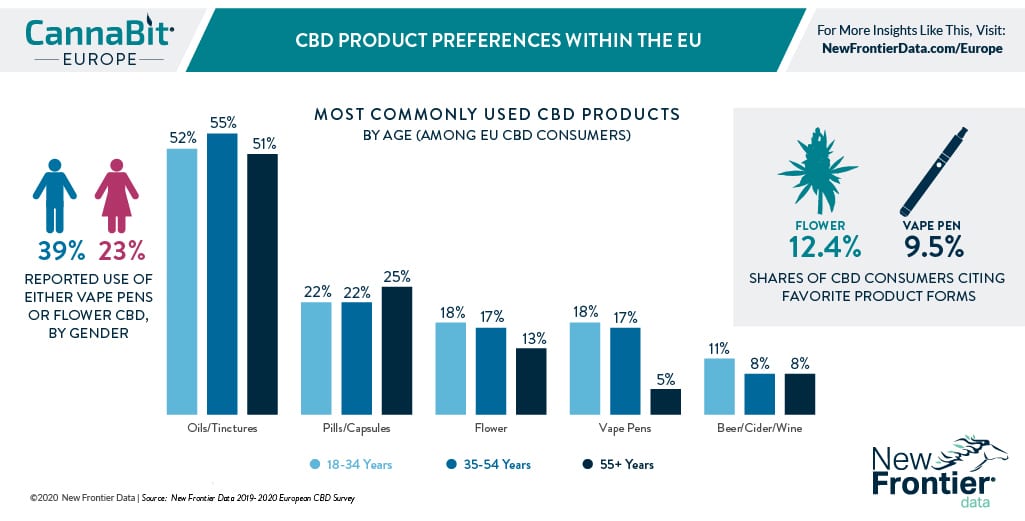BUSINESS
European Challenges in Advertising CBD: Poland
By George Havaris and Malwina Niczke, B2R Law (special to New Frontier Data) As has been previously detailed in this space, as more Europeans embrace cannabidiol (CBD), significant opportunities are arising for producers and retailers to build continent-wide brands. Doing so effectively will require a nuanced understanding of the differences between the continental market’s eight […]
The post European Challenges in Advertising CBD: Poland appeared first on New Frontier Data.

By George Havaris and Malwina Niczke, B2R Law (special to New Frontier Data)
As has been previously detailed in this space, as more Europeans embrace cannabidiol (CBD), significant opportunities are arising for producers and retailers to build continent-wide brands. Doing so effectively will require a nuanced understanding of the differences between the continental market’s eight generally established regional markets, and creating products (and messaging strategies) which are sufficiently well aligned to meet the needs of the fastest-growing consumer groups.
CBD products as such feature a high CBD content as opposed to any amount of Δ9-THC content (delta-9-tetrahydrocannabinol and tetrahydrocannabinoleic acid), which cannot exceed 0.20% on a dry-weight basis.
Hemp-derived products for centuries held a significant position in nutrition and traditional medicine. In contemporary times, they for decades lost their popularity due to restrictive drug policy, but for several years now interest in the nutritional, useful and medicinal properties of such products have increased and, consequently, their value in the global cannabis market is growing.
In the food industry, including the dietary supplements market, there is a wide range of CBD products available. In Poland (where B2R Law is based and practices), while there is no legislation that specifically regulates trading or advertising such products, entities operating in the space are not entirely at liberty to operate at will. A general rule of advertising is that it must not mislead the customer or unduly influence his/her decision to buy a good or service. Otherwise, such conduct would be an act of unfair competition which, in some cases, may rise to the level of a criminal offense.
Under European Union (EU) law, labeling, presentation, and advertising cannot attribute characteristics and properties to food that it does not possess. A message that states, suggests, or implies a link between good health and a particular food product (or its ingredients) is called a health claim.
To prevent consumers from being misled, restrictions prohibit the use of health claims about ingredients for which no nutritional/medicinal efficacy has been confirmed (or for which no unequivocal scientific position exists). Pursuant to EU regulations, health claims are forbidden if (a) the European Commission (EC) did not grant permission to use them (in accordance with Regulation 1924/2006), and (b) they do not appear on the list of permitted health claims. The list of permitted statements includes content about the nutrients contained in seeds, hemp oil, and their preparation (Regulation 432/2012); therefore, the provisions allow consumers to be informed about the products’ health benefits.
In the case of CBD, it appears that no applications have yet been made to authorize health claims regarding any benefits of cannabidiol. Subsequently, many CBD products may be advertising illegally.
Legal uncertainty also impacts certain CBD products classified as food, in the context of regulations pertaining to novel food. Products derived from plants or parts of plants of Cannabis sativa L. (such as seeds, seed oil, hemp seed flour, defatted hemp seeds, etc., have a documented history of consumption in the EU before 15 May 1997. It likewise follows that either the hemp-fiber component or an intermediate product obtained from the plant (which naturally contains inherent levels of CBD) are not subject to restrictions on novel foods.
However, CBD in any other form (i.e., [1] CBD obtained from higher hemp concentrations than naturally occurring in the plant, [2] CBD from plants other than hemp, or [3] synthetic CBD) qualify as novel foods and thus must be authorized by the EC to be food ingredients. Placing such products on the market as foodstuffs first requires that the procedures set out in Regulation (EU) 2015/2283 on novel foods are followed. If the process is positive, the EC authorizes the availability of novel foods on the EU market (with the EU list duly updated).
Producers of CBD products are advised to exercise caution in preparing their products for market. Beyond the commonly significant expense of an advertising budget, unexpected legal issues may arise. Additionally, producers ought to be mindful of how even a properly structured advertising message can be blocked, as often happens across the most popular advertising media, including Facebook and Google ads.
For a more comprehensive review of regional EU consumer tastes, download New Frontier Data’s EU CBD Consumer Report: 2019 Overview; download the full report here to gain deeper insight into Europe’s expansively emerging consumer markets.
The post European Challenges in Advertising CBD: Poland appeared first on New Frontier Data.










